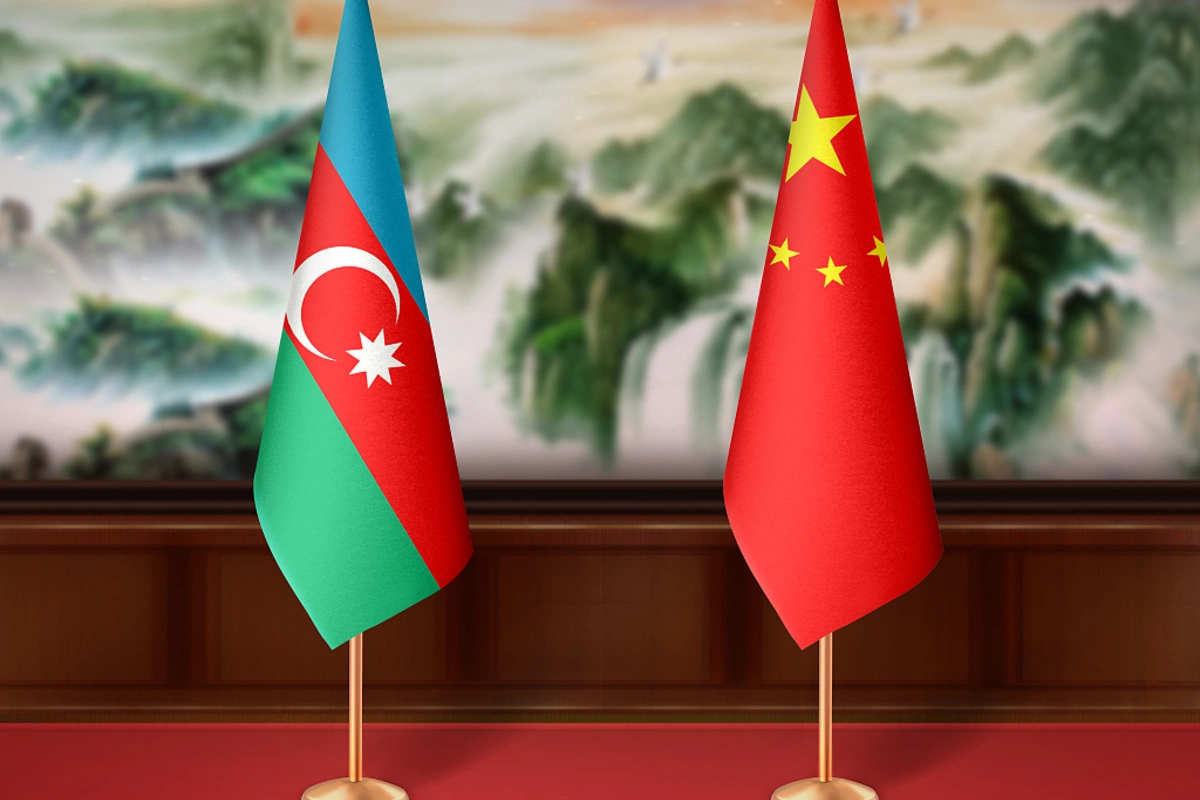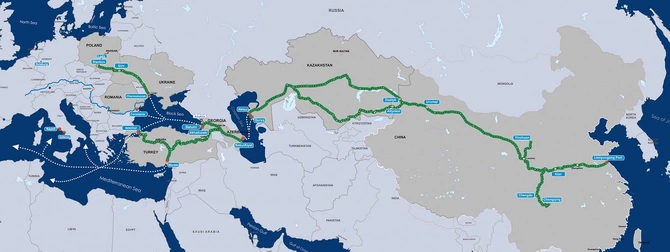
Photo/VCG
The year 2024 has become a turning point for Azerbaijani-Chinese relations. On July 3, on the sidelines of the 24th meeting of the Council of Heads of State of the Shanghai Cooperation Organization in Astana, a Declaration on the Establishment of a Strategic Partnership was signed. This historic document was endorsed by the two heads of state-Ilham Aliyev and Xi Jinping. From that moment on, relations between Baku and Beijing entered a new phase, giving fresh impetus to the bilateral processes that have been developing for several years in the interests of both countries.
Today, the portfolio of Azerbaijani-Chinese relations spans various sectors, including green energy and the participation of Chinese companies in the restoration of liberated territories. However, the transport and logistics sector remains the main item on the bilateral agenda at present. On December 3, the 300th container block train was dispatched from China to Azerbaijan along the Trans-Caspian International Transport Route (TITR)-also known as the Middle Corridor. The train set out from the Xi’an terminal on the Kazakh-Chinese border. It is expected to arrive at the Baku International Sea Trade Port on December 8-10. The departure of this block train was organized under a cooperation agreement between ADY Express and Xi'an Free Trade Port.
According to Azerbaijan Railways CJSC, the volume of goods transported from China via the TITR has already exceeded 27,000 TEU, which is 25 times more than in the same period last year. This indicates growing interest among shippers in the TITR. The development of cargo transportation between China and Azerbaijan strengthens the Middle Corridor as a vital transport artery, providing shippers with access to fast and efficient delivery services in both directions.
The end of the year proved eventful. In addition to the acceleration of the Xi’an-Baku route, it is noteworthy that freight shipments also began in the opposite direction. On November 24, for the first time, a rail freight train carrying export cargo departed from Baku for China. The first export block train from Baku to Xi’an consisted of 62 containers, which were delivered via Kazakhstan to one of China’s major ports. Up to 600 containers are expected to be shipped via this route by the end of the year.
Regular exports to China along the TITR will create new opportunities to boost freight volumes and revenues for key players in Azerbaijan’s logistics network, such as Azerbaijan Railways, the Absheron Logistics Center, and the Baku International Sea Trade Port. This process is already in motion, and in 2025, plans call for more than tripling the number of block trains-to a total of 1,000.
On September 20, in the Chinese city of Xi’an, the Trans-Caspian International Transport Corridor for the China-Europe railway express was inaugurated with great ceremony. A train of 55 forty-foot containers traveled along the TITR, following the route Xi’an-Altynkol-Aktau-Baku-Poti-Burgas-Belgrade-Hamburg-Budapest.

Photo: timesca.com
Another noteworthy “first” in Azerbaijani-Chinese logistics cooperation was the direct delivery of goods between Azerbaijan and China by road. At the end of June, Azerbaijani trucks left the Chinese city of Alashankou and reached Baku in just six days, traveling via China, Kazakhstan, Russia, and Azerbaijan. Until then, no direct road transport services had operated between China and Azerbaijan; shipments primarily involved transferring cargo from one vehicle to another. Thus, for the first time, Azerbaijani carriers delivered goods directly from China without intermediate reloading.
It should be noted that in 2024, Azerbaijan and China exchanged “permit” forms for international road haulage. This expanded the geographic scope of international transportation for Azerbaijani transport companies, bringing the number of countries with which Azerbaijan conducts logistics operations to 51.
TITR is an intermodal route where maritime transport plays a special role. Accordingly, great attention is being paid to the development of Caspian ports, with Chinese partners actively involved in this work.
On the sidelines of the 29th session of the Conference of the Parties to the UN Framework Convention on Climate Change (COP29) in Baku, dozens of meetings, discussions, and negotiations were held, and a number of bilateral and multilateral documents were signed among the event participants. One of the key outcomes for the region is the Agreement on Implementing a Project to Create an Intermodal Freight Terminal at the Baku International Sea Trade Port in Alat. This agreement was signed by Taleh Ziyadov, Director General of the Baku Port; Nurlan Sauranbayev, Chairman of the Board of JSC Kazakhstan Railways (KTZ); and Yuan Xiaojun, Director General of Xi’an Free Trade Port Construction and Operation Co., Ltd.
The terminal will be a crucial piece of infrastructure for handling various types of cargo using multiple modes of transport, including maritime, rail, and road. In the project’s first phase, a 40-hectare facility will be created and developed. The new terminal will include a universal cargo platform, a covered warehouse complex spanning 5,000 square meters, and a container yard with capacity for more than 1,000 containers.
The second phase of construction at the Baku port is already underway. The first phase provided a throughput capacity of 15 million tons of cargo. The second phase will allow the port to handle up to 25 million tons of cargo and will focus primarily on container transportation. Most cargo shipped from China to Europe, as well as from Central Asia to Türkiye, will be containerized. In this context, the construction of a new intermodal freight terminal in Alat by Chinese partners is of great importance, given that container volumes from China to Europe are set to grow gradually from 100,000 to 300,000 containers. The new terminal will significantly increase the volume of container trains along the China-Europe-China route via the Trans-Caspian International Transport Route, reduce transportation costs, and shorten cargo handling times. Azerbaijan, China, and other project participants alike have a vested interest in this development.
Of particular note is China’s heightened activity along the Middle Corridor since the start of this year. In 2024, China has made a markedly larger contribution to developing the Trans-Caspian International Transport Route. The 300th container block train to run via the TITR is an extremely encouraging indicator-especially considering that in 2023, only 11 block trains traveled this route.
Share on social media